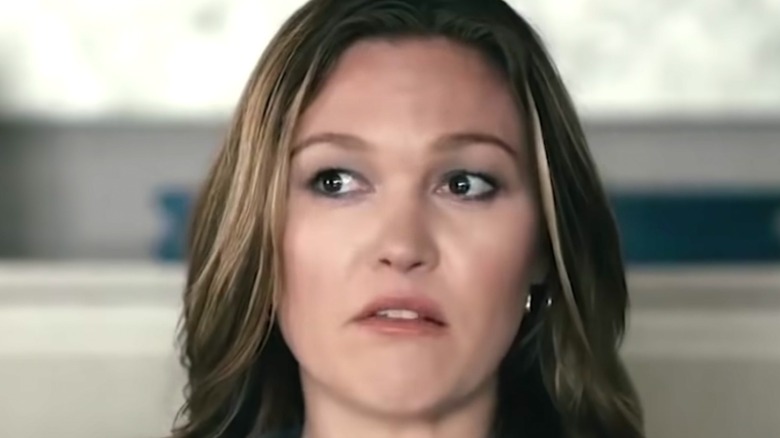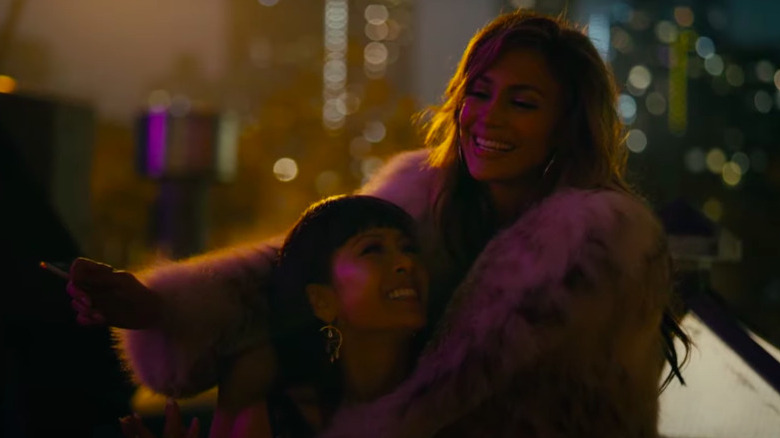How Accurate Is Hustlers To The True Story?
Starring Jennifer Lopez, Constance Wu, Keke Palmer, and Lili Reinhart, "Hustlers" is a great watch from start to finish. At first glance, "Hustlers" is an exhilarating cross between a crime drama and a comedy, but it also delves into themes like the toxic cycle of capitalism, power dynamics between men and women, and the strength found in female friendships. With an all-star cast and a poignant message at its core, the critically acclaimed movie, which got an 87% rating on Rotten Tomatoes, has both style and substance. The plot of the film is so entertaining and over the top that it's hard to believe that "Hustlers" is actually inspired by real events.
"Hustlers" is based on New York Magazine's December 2015 article "The Hustlers at Scores" by American journalist Jessica Pressler. A fictionalized version of Jessica even appears in the movie. Julia Stiles plays Elizabeth, a journalist writing an article about the scammers, whose inquiries into past events prompt the main characters to reflect on their lives. While the plot is primarily based on a true story, some aspects of "Hustlers" are fabricated. Let's differentiate fact from fiction below.
Hustlers is mostly accurate
First and foremost, the film changed the names of the actual women involved in the scandal. "Hustlers" features Jennifer Lopez as Ramona Vega, a character that's based on real-life ringleader Samantha Barbash, a.k.a. Samantha Foxx. Constance Wu portrays a dancer named Destiny, who's inspired by a woman named Roselyn "Rosie" Keo. Keke Palmer and Lili Reinhart play schemers Mercedes and Annabelle, characters inspired by Marci Rosen and Karina Pascucci, respectively.
At the film's conclusion, all four women are caught in a sting operation. Ramona is ultimately sentenced to five years probation, while her partners end up serving jail sentences on weekends before being released on probation. This is depicted accurately except for one key detail. Similar to Ramona, Samantha Barbash pleaded guilty to conspiracy, assault, and grand larceny in exchange for five years of probation. Rosen and Pascucci were sentenced to four months of weekend incarceration, along with five years of probation. The difference is that, unlike Constance Wu's Destiny, Keo never served any jail time. In exchange for a plea deal, Keo also received five years of probation (via Oprah Daily).
The movie proved to be the biggest live-action opening of Lopez's career, raking in around $33 million during opening weekend (via Box Office Mojo). However, according to Ramona's real-life counterpart Barbash, "Hustlers" got it all wrong.
The movie faced a lawsuit from Barbash
Although she willingly told her story to Jessica Pressler for the article that inspired "Hustlers," Samantha Barbash was not happy with her depiction in the movie. In fact, Barbash took her complaints to the courtroom. As reported by BBC, Barbash sued the film's producers in 2020.
"Defendants did not take caution to protect the rights of Ms. Barbash by creating a fictionalized character, or by creating a composite of characters to render J-Lo's character a new fictitious one; rather they engaged in a systematic effort to make it well-known that J-Lo was playing Ms. Barbash," the lawsuit argued. Barbash claimed that the film invaded her privacy and defamed her character. She also took issue with the depiction of Ramona's drug use. In "Hustlers," Ramona plays a huge role in developing a drug concoction that dupes their targets. Barbash asserts that she never manufactured or used drugs (via The Guardian).
Although the court noted some discrepancies between Barbash's life and her fictional counterpart in "Hustlers," she was unable to prove her case based on the stipulations presented in the lawsuit. The court ruled against Barbash and the case was ultimately closed (via Entertainment Weekly). If you want to learn more about the real story behind "Hustlers," several of the people involved have written books on the matter. Roselyn Keo penned "The Sophisticated Hustler," and Barbash refutes claims made in Pressler's article in her book "Underscore" (via Oprah Daily).


